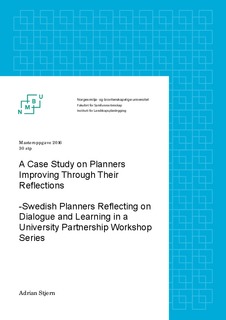| dc.description.abstract | This thesis explores the pivotal role of “reflection” in and on practice, in a workshop process of improving planning practice. The theoretical impetus of this research comes from the recent contributions of ideological critique against communicative planning. Wherein planners and planning in general often function as the scapegoats to the ideology when practice falters. Recent research has even questioned whether we are witnessing an ongoing ideological politicisation of planning by these mechanisms. There is therefore a need to reframe our research from the bottom-up, to examine “real” practice and its ideological influences.
Taking into account the recent conceptualisation of “spaces for action”, I concur that even though organizational improvements have enhanced “possible spaces for action”, the resulting practice is limited by practitioner’s reflections on “actual spaces for action”. This means that there is a need for a greater understanding of how practitioners reflect in and on their practice. In regards to this, the thesis takes a step back, to contemplate whether the new conceptual framework of “spaces for action” in conjunction with the established theory on “reflective learning” could represent a perspective to challenge contemporary ideological influences on planning.
I base this on the argument that a contemporary practice problem for planning is the repeating focus of organizations to response to criticism through the reworking of an ideal of “best” practice. Consequently, I argue that the organizational process of improving is as much influenced by ideological factors in developing “best” practices ideals as practitioners are in their “real” practice. I analyse that both the theoretical contestation of communicative planning theory and the intermediate organizational focus of improving through “good” practices, diverts much needed attention away from actually improving practitioner’s capacity to deal with the complexity of “real” practice. As “good” practices focus on “possible spaces of action”, improving planners “actual spaces for action” are left virtually unchecked. “Good” practices therefore fall short to the same critique of “best” practice, when faced with the complexity of “real” practice.
I conclude that both contemporary theory and practice could benefit from a renewed interest in reflective learning theory, and that further research is needed to develop a system for perpetual organizational learning through the “reflective” potential of their experienced practitioners, especially when faced with criticism to improve. | nb_NO |

